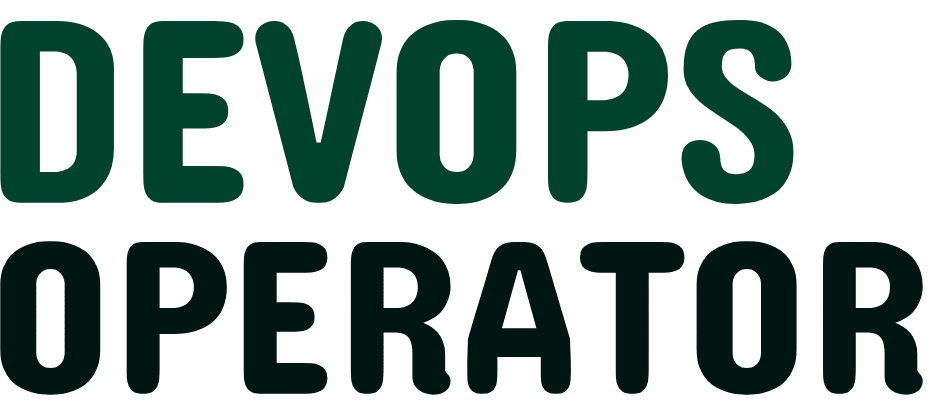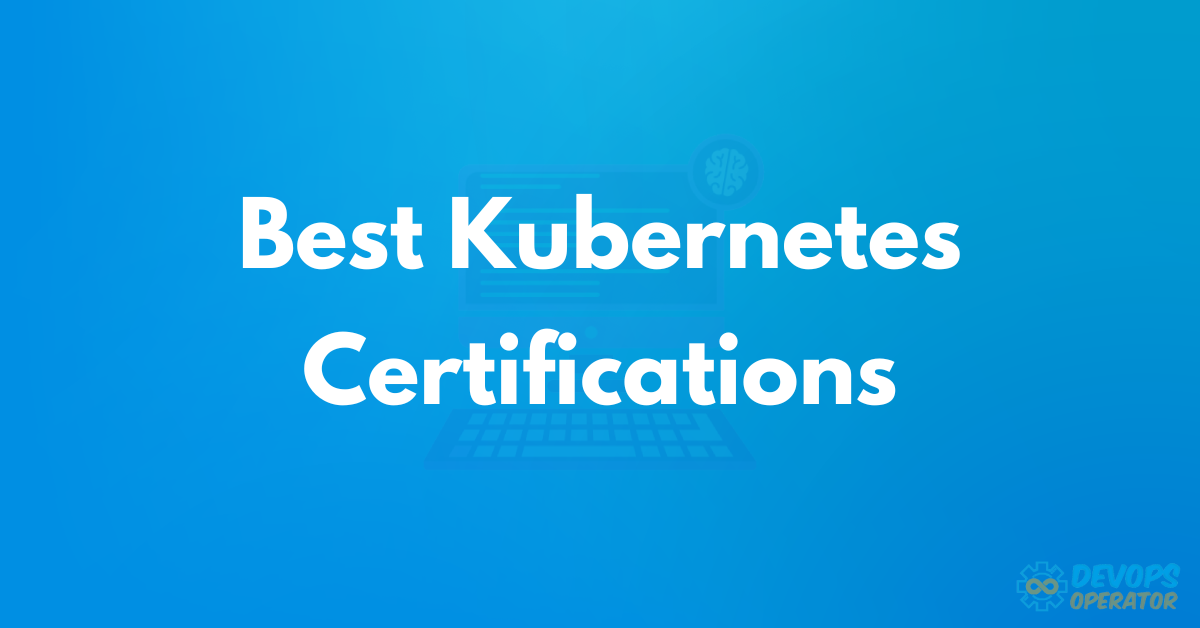If you want to build a successful career in Kubernetes, I can help you find the best Kubernetes certifications. Kubernetes is gaining more popularity because of its increasing demand in DevOps.
Kubernetes has been helping many engineers advance their careers and negotiate more on salary. According to a survey done by the Cloud Native Computing Foundation, 96% of tech enthusiasts are either using or learning Kubernetes.
In this guide, I will mention some of the Best Kubernetes Certifications (also referred to as k8s certification) that you may learn from. Let’s DIVE IN!!
Unlock exclusive savings on OceanWP themes with our limited-time OceanWP Coupon! Revamp your website affordably with our OceanWP Coupon code today!
What is a Kubernetes Certification?
The CKA certification is highly valued in DevOps roles and is suitable for both seasoned IT professionals and recent graduates.
Kubernetes certification will enhance your resume by validating your proficiency in Kubernetes, which is often a requirement for certified Linux system administrators and makes it a top choice among DevOps certifications.
Some of the most popular Popular Kubernetes Certifications are CKAD, CKA, CKS, KCNA, and KCSA, which the Linux Foundation organization with the CNCF offers.
You should be aware that these courses are well-known and widely acknowledged in the industry and are a good way to show how skilled someone is at using and handling Kubernetes.
The process of these Linux admin certifications includes a guided training course, and exams to enhance your expertise and show skills to employers, colleagues, and partners.
People who know how to use Kubernetes make, on average, around $117k per year according to Payscale, or $150000 per year according to Talent.com.
On LinkedIn, there are 124,565 jobs related to Kubernetes in the USA. Out of those, 28,000 jobs pay more than $10000, and 302 jobs pay over $200000.
The highest salary mentioned on Glassdoor is $69,655 per year.
Why Should I Learn Kubernetes?
I started learning Kubernetes at the start of my career. It helped me advance my career and stay relevant in the world of technology.
Let me brief you about some of the main reasons to include Kubernetes certification:
Meeting the Growing Demand
When I look for job opportunities on platforms like LinkedIn, I notice a significant demand for professionals with Kubernetes certifications.
Recent data shows that Kubernetes has become a necessity in the DevOps sector.
According to PayScale data (last updated on June 12, 2022), a DevOps engineer with Kubernetes experience earns a median salary of $114,287 annually.
This indicates the high demand and the value of Kubernetes skills in the industry.
Enhancing Skills
Analyzing the best websites to learn to code online is a fantastic way to kickstart my journey into the world of programming.
Learning Kubernetes empowers me to understand how software is deployed and managed in a containerized environment.
This knowledge helps optimize performance, reliability, and security, making me a more effective and informed developer.
As an operations manager, Kubernetes can make my deployments easier to change, offering a streamlined approach to applying manifests and managing clusters on platforms like Amazon Web Services (AWS).
Strengthening Security
Learning Kubernetes is a strategic move toward understanding and mitigating security risks associated with software and its environment.
It equips security experts with the knowledge to create a robust and secure environment. There will be significantly less space for errors.
Fostering a Collaborative Culture
Kubernetes promotes a unified approach within organizations. It provides a common platform for development, security, and operations teams to encourage collaboration.
This enhances productivity and creates a culture of unity and cooperation across different disciplines.
Best Kubernetes Certificates
I am mentioning the best Kubernetes certificates for you to start learning today. Check out the following best certificates to kickstart your Kubernetes learning experience:
Certified Kubernetes Administrator (CKA)
The CKA certification is my top choice because it has helped me fulfill my aspirations as a DevOps engineer.
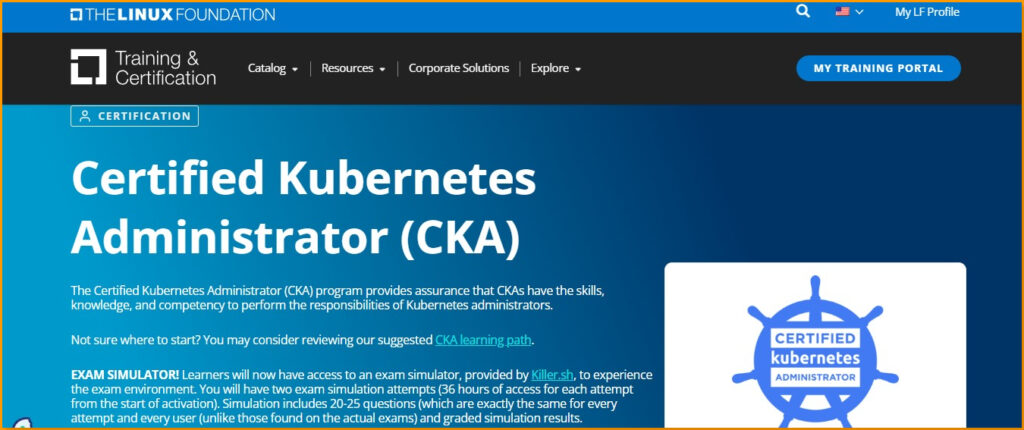
According to TechRepublic reports, the Certified Kubernetes Administrator (CKA) is considered one of the best certifications for DevOps engineers.
The hands-on CKA exam requires me to solve Kubernetes tasks, offering a practical approach and CKA practice labs to assess my skills.
The domains covered include Storage, Troubleshooting, Workloads and scheduling, Kubernetes Cluster Architecture, Installation and configuration, and Services and networking.
In DevOps, CKA is a valuable certification for experienced IT professionals and freshers.
Before jumping in, it’s important to think about the cost of DevOps Bootcamp or training programs. This helps you plan your finances well and decide how to allocate your resources wisely.
Achieving CKA certification assures employers you have the necessary skills, knowledge, and competency to excel in Kubernetes administration.
Certified Kubernetes Application Developer (CKAD)
CKAD certification is an amazing choice if you focus on cloud-native microservices application development and deployment.
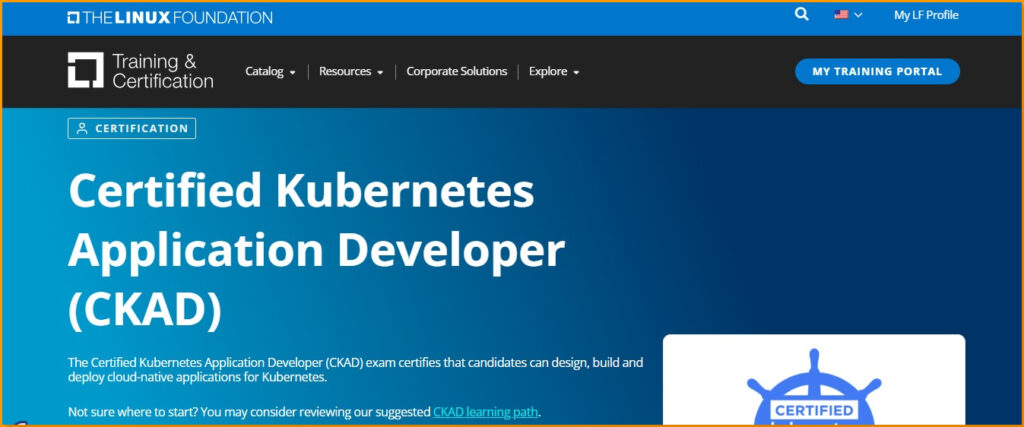
This performance-based and hands-on exam evaluated my ability to design, build, and deploy cloud-native applications for Kubernetes.
CKAD covers applications design and build, application deployment, application Observation and maintenance, application environment, configuration, security, and services and networking.
CKAD is kind of like the test for people who want to be really good at developing stuff with Kubernetes, while CKA is more for those who want to be experts in managing and operating Kubernetes.
The CKAD test is shorter and has more hands-on tasks compared to the CKA test.
After successful completion of CKAD certification, you can showcase your expertise in cloud-native best practices related to Kubernetes application development.
Certified Kubernetes Security Specialist (CKS)
CKS certification is one of the highest certifications and is highly relevant for engineers involved in cloud-native security.
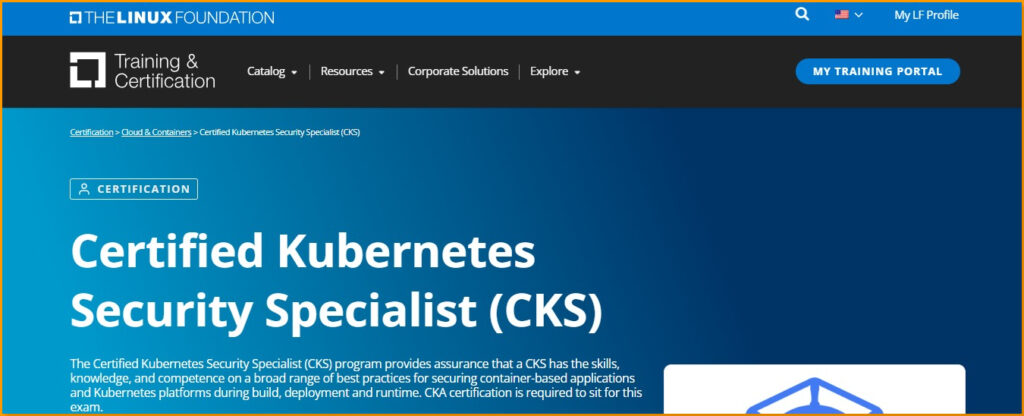
Security is the primary concern in containerized environments, and this certification adds value to cloud-native engineers. To qualify for CKS, you must pass the CKA certification.
CKS focuses on Kubernetes security, covering domains like Cluster Setup, Cluster Hardening, System Hardening, Minimize Microservice Vulnerabilities, Supply Chain Security, Monitoring, Logging, and Runtime Security.
This certification helps with the skills to implement security best practices throughout the container lifecycle.
Kubernetes and Cloud Native Associate (KCNA)
KCNA certification is an amazing option for learning about cloud-native ecosystems.
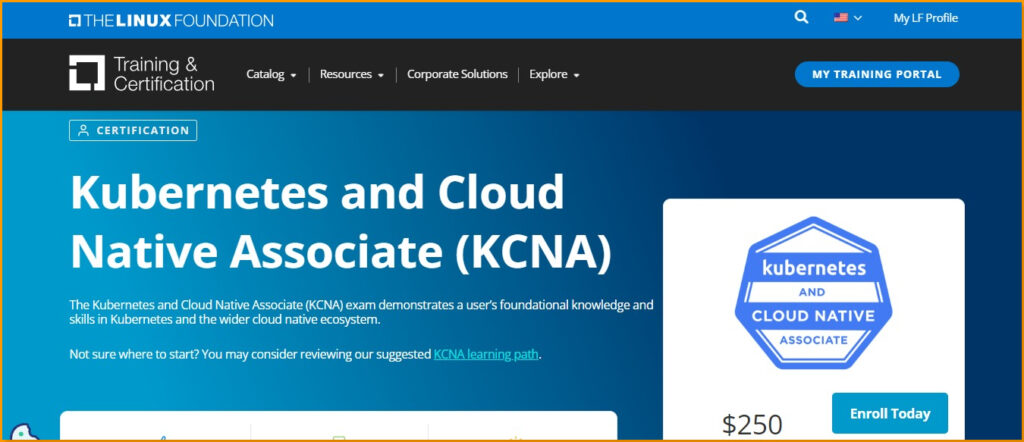
This Kubernetes certification course is designed specifically for students, IT managers, and engineers, or even for beginners.
It has multiple-choice questions on Kubernetes and related tools in the cloud-native landscape.
The KCNA exam covers a range of topics, including Introduction to Kubernetes, Kubernetes Architecture and Components, Kubernetes Networking, Kubernetes Storage, Kubernetes Security, Kubernetes Monitoring and Logging, Cloud-Native Application Development, and Container Orchestration with Kubernetes.
This foundational certification gives me a broad understanding of Kubernetes and its surrounding technologies.
Certified Calico Operator by Tigera
The Certified Calico Operator course, offered by Tigera, talks about Kubernetes networking. It also focuses on managing Calico, a prominent open-source security solution.
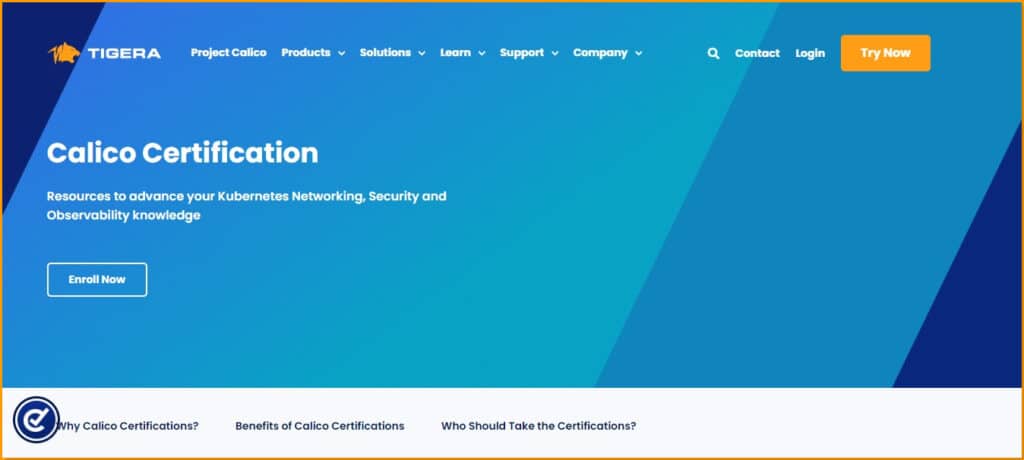
This course fits individuals in network and security roles, DevOps professionals, and platform architects.
Kubernetes is the standard for deploying cloud-native applications, and Calico stands out as a top-tier security solution.
This course provides me with the expertise to handle mission-critical workloads in a production environment confidently.
The course includes an introduction to Kubernetes networking and installing Calico, a network policies module, a network connectivity module, a Kubernetes services module, and more.
Azure Kubernetes Service – AKS Admin Guide by Udemy
This Azure Kubernetes Service available on Udemy aims to create and manage Kubernetes.
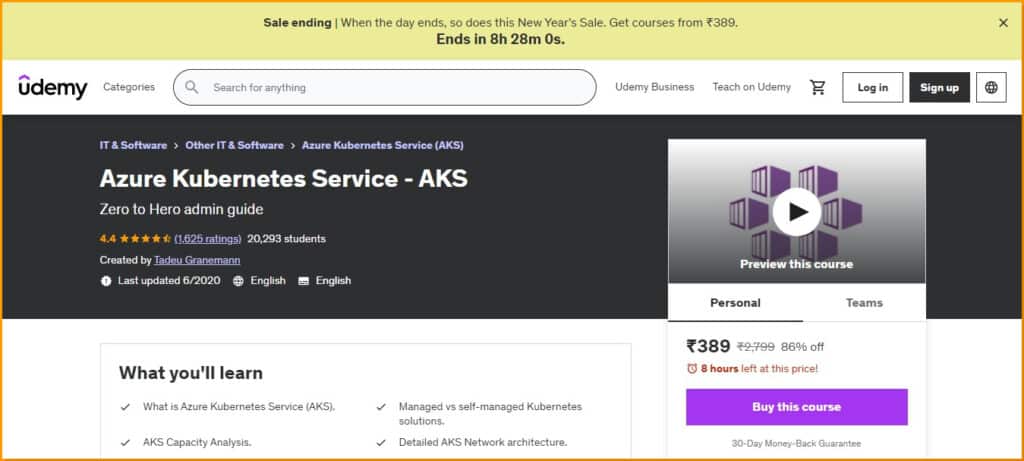
The certification validates my capabilities in administering AKS, a leading managed service in the market. It is ideal for Kubernetes administrators overseeing Azure infrastructure.
The curriculum includes managed vs. self-managed Kubernetes solutions, AKS capacity analysis, the detailed network architecture of AKS, integrating AKS with active directories, AKS clusters using Azure Portal, AKS authorization, authentication, monitoring, and log debugging.
This course can help Azure professionals to enhance skills, gain confidence, and elevate credibility in the job market.
Amazon Elastic Kubernetes Service (EKS) Course by AWS
Amazon Web Services (AWS) presents an intermediate course on Amazon EKS, providing certification with practical, in-depth skills for managing containers within Kubernetes.
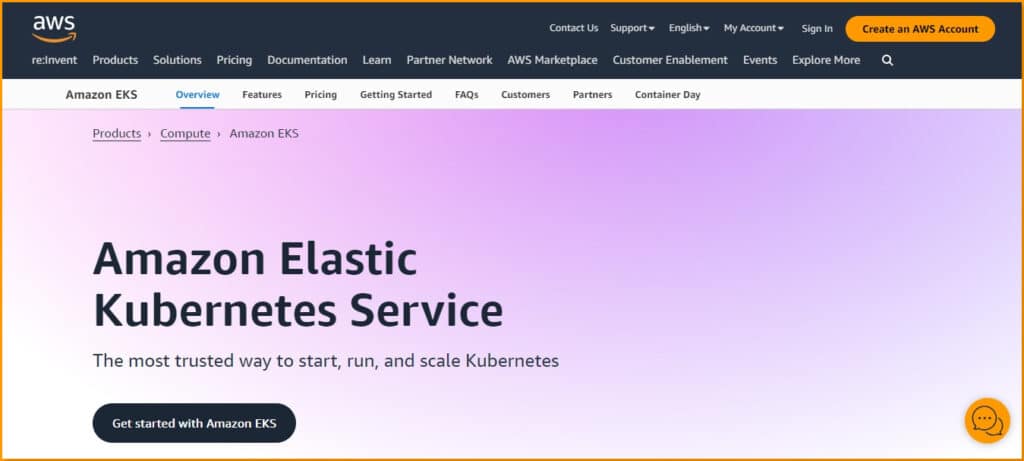
It is designed for DevOps engineers, system administrators, and AWS cloud practitioners.
The course includes building Amazon EKS clusters, deploying and adding applications to clusters, managing container images using Amazon ECR, automating application deployment with CI/CD tools, configuring AWS networking services to support the cluster, and securing the Amazon EKS environment.
System administrators and DevOps engineers looking to advance their container management and orchestration skills using Amazon EKS should consider this comprehensive course.
Kubernetes Cluster Management Certification Training (KCMCT) by IntelliPaat
Intellipaat offers KCMCT and covers fundamental and advanced Kubernetes topics, including cluster access, visualization, fleet cluster, and monitoring Kubernetes cluster status, among others.

It is a self-paced certification course. This course is for developers and candidates interested in mastering Kubernetes.
The course includes managing Kubernetes clusters at scale, fleet architecture, and components; fleet controller or manager, cluster agents, registration, access upgrades, and bundle layout; visualization, building on K3S and Rancher; architecture, installation, backup, and restoration; volumes and storage, networking, advanced options, and configurations.
Certifications Cost for Kubernetes
You can refer to the table below for the Kubernetes certification cost & pricing of the courses mentioned above:
| Certification Name | Individual Price | Bundle Price (with Course) |
| Certified Kubernetes Administrator (CKA) | $395 | $595 |
| Certified Kubernetes Application Developer (CKAD) | $395 | $595 |
| Certified Kubernetes Security Specialist (CKS) | $395 | $595 |
| Kubernetes and Cloud Native Associate (KCNA) | $250 | $299 |
| CKA + CKS Bundle | $725 | N/A |
| Certified Calico Operator by Tigera | Free | N/A |
| Azure Kubernetes Service – AKS Admin Guide by Udemy | $84.99 | N/A |
| Amazon Elastic Kubernetes Service (Amazon EKS) Course by AWS | $1,050. | N/A |
| Kubernetes Cluster Management Certification Training (KCMCT) by IntelliPaat | $190 | N/A |
How to Register for Kubernetes Certification?
To register for the Kubernetes Certifications, simply follow the easy process mentioned below. Most of the popular courses are offered by the Linux Foundation.
Step 1: Go to the official page of the Linux Foundation
Step 2: Select your desired course or certification from the official catalog.
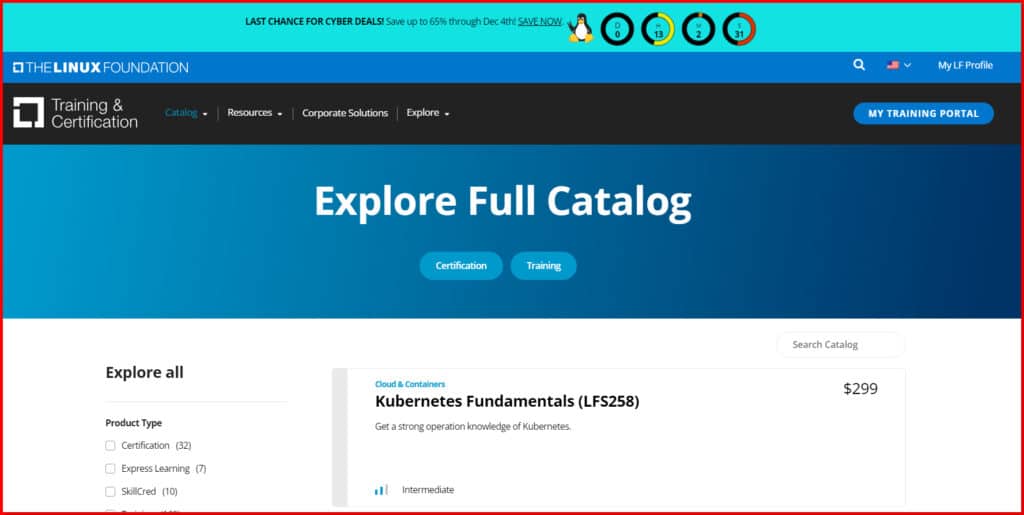
Step 3: Proceed to the checkout page and enter the Linux Foundation coupon to save 25%.

Step 4: Complete the order by paying for the discounted price.
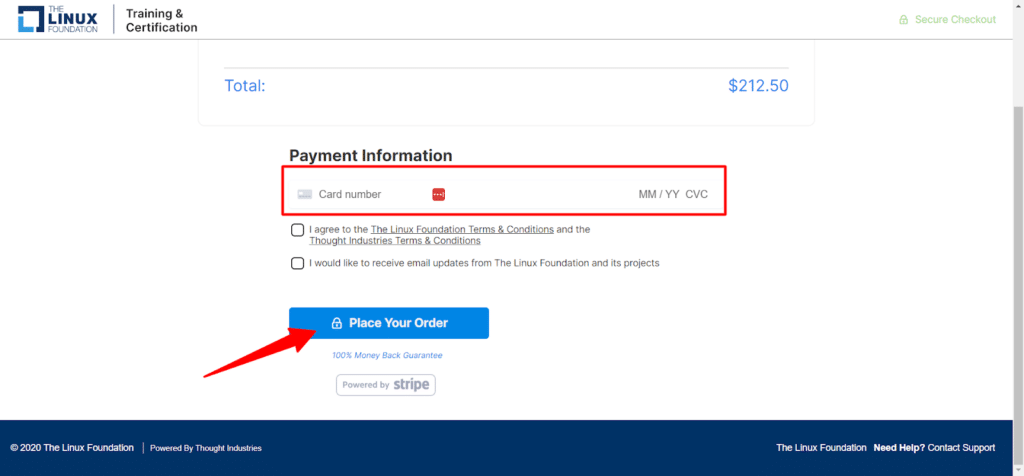
Tips to Prepare for the Kubernetes Exams
Below, I am sharing some of the tips that I religiously followed while appearing for the Kubernetes exam:
- Familiarize yourself with all the exam topics.
- Take the time to understand the topics covered in the exam thoroughly.
- Create a roadmap for my study plan.
- Focus on the key areas that the exam will assess.
- Read the exam guide properly.
- Exam Guide is the go-to resource for understanding the structure and format of the exam. Gain insights into the types of questions, the time duration, and any specific instructions. Reduce uncertainty and build confidence for the exam.
- Use practice exams to measure your knowledge.
- Identify the areas that need more attention.
- Look for practice exams to get used to the exam environment.
- Calm and focused approach on the exam day.
- Remember to take your time while attempting the question.
- Read each question carefully and fully understand what is being asked.
- Eliminate incorrect answers and narrow down choices to increase the possibility of selecting the correct answer.
- Build a solid foundation of knowledge.
- Develop effective strategies for navigating the challenges of the Kubernetes certification exam.
Conclusion
Hopefully, this guide on the Best Kubernetes Certification path gave you the course that is the right fit for you. I have mentioned all the essential certifications covering all the crucial topics in Kubernetes.
Getting certified in Kubernetes Security (CKS) is worth it if you want to learn more about keeping Kubernetes safe.
If you’re interested in the basics of Kubernetes security and want a certification with a shorter syllabus, CKS might be the perfect fit for you.
Kubernetes certification will help you advance your skills and knowledge, eventually increasing career opportunities.
The certifications for Kubernetes courses will make you stand out in the crowd of DevOps engineers. Visit the official website to enroll in the Kubernetes courses today.
References:
Frequently Asked Questions
Which is Better, CKA or CKAD?
Basically, if you want a fast certification in Kubernetes, then it is suggested that you go for CKAD, as it is easier to get ready for and pass the exam. But if you really want to understand Kubernetes on a deeper level, especially if you’re into system administration and operations engineering, then CKA is the better option.
Is CKA Certification Worth It?
Yes! Linux Foundation CKA certification is worth it. Because it is like a special badge for your administration and management skills in Kubernetes, if you get certified, you’ll have an extra advantage over your friends who don’t have it because companies who hire want someone who’s officially certified. It’s like having a special, secret skill on your side!
Which Kubernetes Certification Should I Get First?
Basically, Certified Kubernetes Administrator (CKA) certification is the first step to starting your journey as a beginner. You should understand the basics of some important topics covered in CKAD, but CKA’s main goal is to build and manage the Kubernetes cluster.
